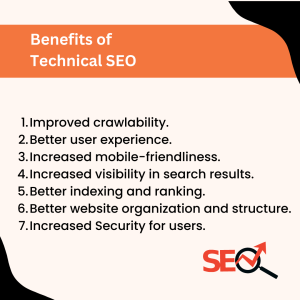What is Technical SEO?
Technical SEO is the process of optimising a website for search engine algorithms. It involves enhancing the site’s coding, structure, and content to make it easier for search engines to find, crawl, index, and rank your pages in relevant search results. Furthermore, Technical SEO helps us to ensure that a website runs quickly and effectively for the optimum user experience. Only a few of the optimization approaches include the appropriate use of meta descriptions, titles, and tags as well as URL architectures. Researching and using keywords effectively is another. To improve rankings on important search engines like Google or Bing, several measures are required. By ensuring that potential buyers can locate your content online, effective Technical SEO tactics can ultimately increase organic traffic.
Before diving into this, here are some terms that you must know about:
Crawling: Crawling is the process by which search engines discover new web pages and websites. Search engines use special software called crawlers (also called spiders or bots) to systematically scan the Internet, following links from one webpage to another. As the crawler comes across new web pages, it adds them to its list of pages to be indexed.
Indexing: Indexing is the process by which search engines take the pages that have been discovered during the crawling process and add them to a giant database, called an index. The index is essentially a giant library of web pages that search engines can quickly search through to find relevant results for a user’s query. The index is organised in a way that makes it easy for search engines to quickly find relevant pages for a particular search query, this is done through the use of algorithms that determine relevance, authority, trust and many other factors.
Website load time: Website load time, also known as page load time, is the amount of time it takes for a web page to fully display in a web browser. This includes the time it takes for the browser to download all the necessary resources (such as images, stylesheets, and scripts), as well as any time spent processing and rendering the page. Page speed matters a lot in the case of SEO.
These are a few terms that are a part of technical SEO, now that you know about them let’s jump into the blog.

How Can Technical SEO Be Used to Improve Website Ranking?
Technical SEO refers to the optimization of a website’s underlying technical infrastructure in order to improve its visibility and ranking in search engine results. Some ways to improve a website’s Technical SEO include:
- Ensuring that the website is easily crawlable by search engine bots. This can be done by providing a sitemap, using clean and consistent URLs, and avoiding the use of Flash or other technologies that are not easily crawlable.
- Optimising website load speed. Search engines take into account the load speed of a website when determining its ranking. This can be improved by using a content delivery network, compressing images and other media, and reducing the number of external scripts and plugins used on the site.
- Ensuring that the website is mobile-friendly. As mobile usage continues to increase, it’s important to ensure that your website is optimised for smaller screens and touch-based navigation.
- Using structured data to help search engines understand the content of your site. This can be done by using schema markup, which provides a standardised set of tags for describing the different types of content on your site.
- Fixing broken links, errors and redirects, to ensure the website is technically sound.
- Having a well-organised XML sitemap.
- Implementing good website architecture, with clear categories and good interlinking, easy navigation
-
Having an HTTPS website.
Benefits of Implementing Technical SEO on a Website:
Implementing Technical SEO on a website can bring several benefits,
including:
- Improved crawlability: Technical SEO helps to ensure that search engine bots can easily access and understand the content on a website, which improves its chances of being indexed and appearing in search engine results.
- Better user experience: Technical SEO helps to improve website performance and speed, which results in a better user experience. Visitors will be able to load pages quickly and easily navigate the site.
- Increased mobile-friendliness: With more and more users accessing the Internet on mobile devices, it’s important for websites to be optimised for smaller screens and touch-based navigation. Technical SEO can help to ensure that a website is mobile-friendly.
- Increased visibility in search results: By ensuring that a website is technically sound and easy for search engines to understand, Technical SEO can help to increase its visibility in search engine results.
- Better indexing and ranking: Proper technical SEO helps search engines to understand the content and structure of a website, which results in better indexing and ranking of web pages.
- Better website organisation and structure: Good Technical SEO can help to ensure that a website is well-organised, with clear categories and good interlinking, which can make it easier for users to find the information they are looking for.
- Increased Security for users: Having an HTTPS-secured website, will ensure that all data passed between the web server and browser will remain private and secure, which can also help with trust and credibility
Overall, technical SEO can play a significant role in helping a website to rank well on search engine results and providing a better experience for users, which in turn can lead to increased traffic, engagement, and ultimately, revenue. Businesses can employ Technical SEO to best achieve their objectives by following the best practices including enhancing mobile compatibility, simplifying website navigation, and speeding up page load times.

















